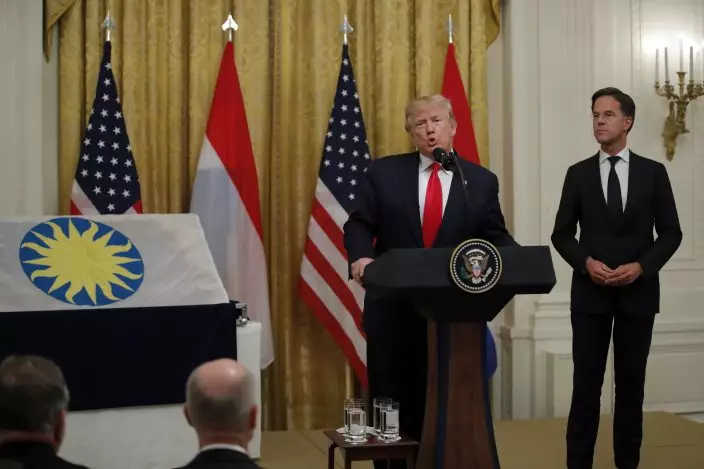It's worn and tattered and stained with oil and diesel fuel, but this Old Glory has returned home.
An American flag that flew on the stern of a boat carrying the first waves of U.S. troops to land in Normandy, France, on D-Day during World War II was donated to the United States Thursday by a Dutch businessman and collector.
The Smithsonian's National Museum of American History says a hole right through the middle of the tattered flag's field of stars is believed to have come from a German machine gun bullet.

President Donald Trump speaks during a ceremony where Dutch Prime Minister Mark Rutte will present a 48-star flag flown on a U.S. Naval vessel during the D-Day invasion, in the East Room of the White House, Thursday, July 18, 2019, in Washington. The flag will be given to the Smithsonian's National Museum of American History. The vessel was control vessel Landing Craft, Control 60 (LCC 60). (AP PhotoCarolyn Kaster)
Trump unveiled the flag in the East Room of the White House during his meeting with Dutch Prime Minister Mark Rutte. The skipper of the D-Day boat — Lt. Howard Vander Beek, from Cedar Falls, Iowa — had the flag until he died in 2014.
"Amid treacherous German minefields, raging winds, and rough seas, Lt. Vander Beek and his crew led an astonishing 19 waves of American troops and equipment to those very, very dangerous beaches," Trump said. "Through it all, this flag soared proudly above the waters of the English Channel, announcing the arrival of our American warriors."
After Vander Beek died, his family sold the flag in an estate sale for $514,000. Dutch businessman Bert Kreuk and his uncle and business partner, Theo Schols, bought it with the idea of donating it back to the United States.
WASHINGTON (AP) — U.S. intelligence officials have determined that Russian President Vladimir Putin likely didn’t order the death of imprisoned opposition leader Alexei Navalny in February, according to an official familiar with the determination.
While U.S. officials believe Putin was ultimately responsible for the death of Navalny, who endured brutal conditions during his confinement, the intelligence community has found “no smoking gun” that Putin was aware of the timing of Navalny's death — which came soon before the Russian president's reelection — or directly ordered it, according to the official.
The official spoke on the condition of anonymity to discuss the sensitive matter.
Soon after Navalny’s death, U.S. President Joe Biden said Putin was ultimately responsible but did not accuse the Russian president of directly ordering it.
At the time, Biden said the U.S. did not know exactly what had happened to Navalny but that “there is no doubt” that his death “was the consequence of something that Putin and his thugs did.”
Navalny, 47, Russia’s best-known opposition politician and Putin’s most persistent foe, died Feb. 16 in a remote penal colony above the Arctic Circle while serving a 19-year sentence on extremism charges that he rejected as politically motivated.
He had been behind bars since January 2021 after returning to Russia from Germany, where he had been recovering from nerve-agent poisoning that he blamed on the Kremlin.
Russian officials have said only that Navalny died of natural causes and have vehemently denied involvement both in the poisoning and in his death.
In March, a month after Navalny’s death, Putin won a landslide reelection for a fifth term, an outcome that was never in doubt.
The Wall Street Journal first reported about the U.S. intelligence determination.

FILE - Russian opposition politician Alexei Navalny gestures while speaking during his interview to the Associated Press in Moscow, Russia on Dec. 18, 2017. U.S. intelligence officials have determined that Russian President Vladimir Putin likely didn't order the death of Navalny, the imprisoned opposition leader, in February of 2024. An official says the U.S. intelligence community has found "no smoking gun" that Putin was aware of the timing of Navalny's death or directly ordered it. (AP Photo/Alexander Zemlianichenko, File)











